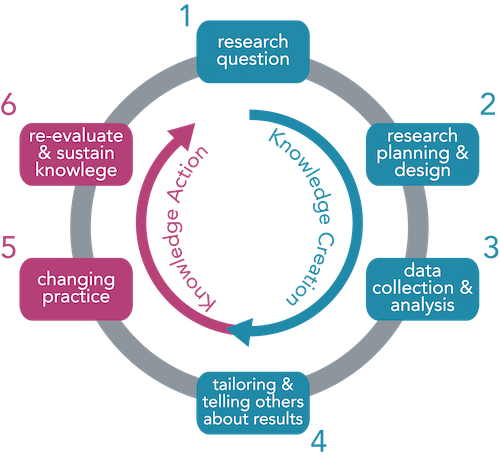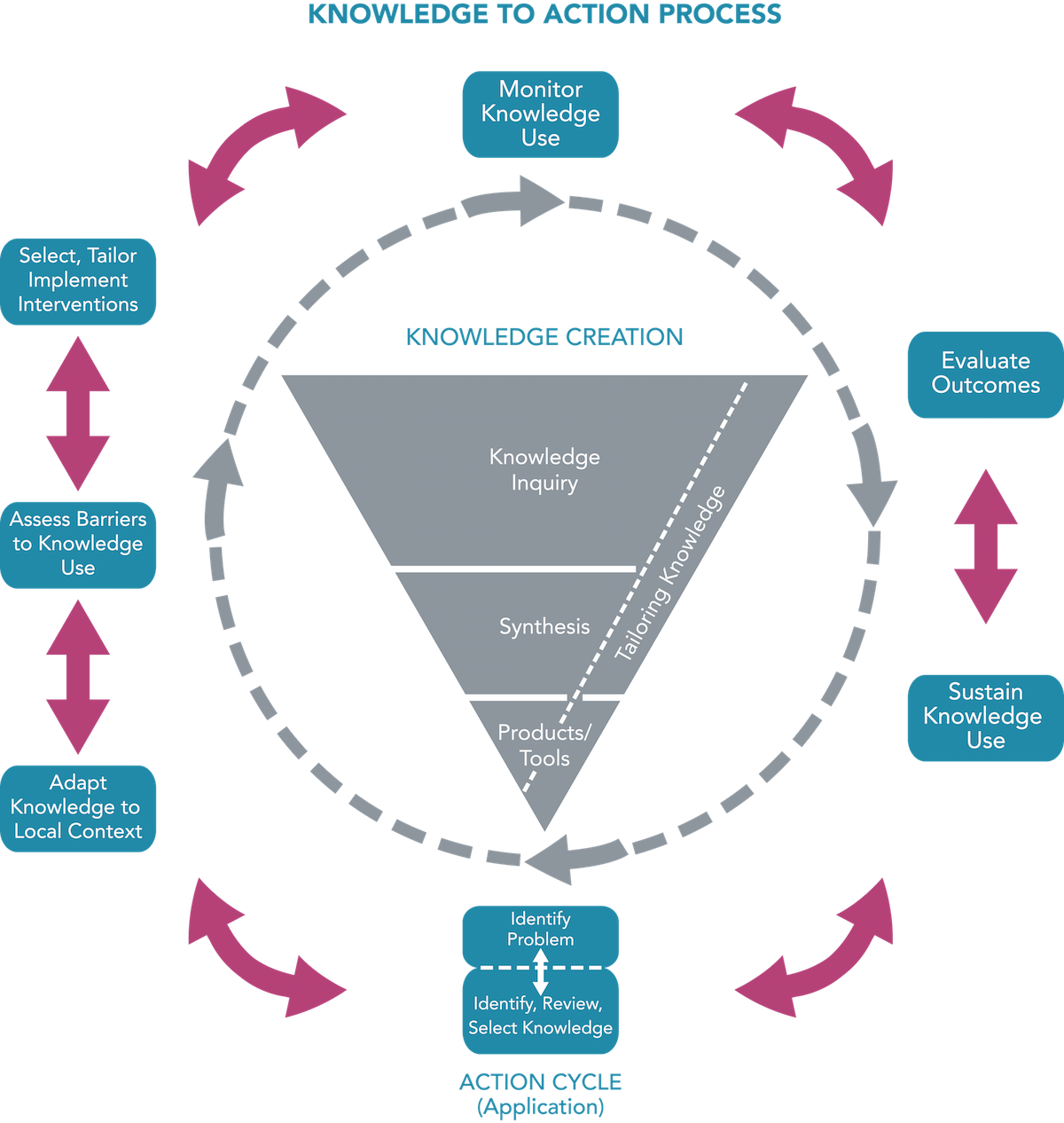Knowledge Translation & Exchange
Health care providers recognize the importance of using research in their day-to-day practice and the overall impact this can have on the health of their clients. However, effectively using research knowledge in practice can be challenging, as there are many barriers to this process, often leading to a "gap" between knowledge and practice. Researchers have recently begun to explore ways to bridge this gap by studying the process of Knowledge Translation (KT). Knowledge Translation involves gathering, evaluating, summarizing and sharing relevant knowledge on a particular topic. It is a complex, two-way process between those who develop the knowledge and those who will use the knowledge. Many terms have been used to describe this process including knowledge transfer, knowledge transfer and exchange, knowledge dissemination, knowledge management, and research utilization.
In the research literature, the effectiveness of many KT strategies have been studied including the use of published articles, lay summaries, training workshops, customized messages (such as email alerts) and the use of local opinion leaders, sometimes referred to as "Knowledge Brokers" or KBs. The evidence suggests some differences in the effectiveness of these strategies and it is not yet known which of these approaches, either alone or in combination, will result in the most effective knowledge translation.
What is Knowledge Translation (KT)?
Knowledge Translation (KT): Definition and Purpose
- Traditionally KT has been defined as a "dynamic and iterative process that includes the synthesis, dissemination, exchange, and ethically sound application of knowledge to improve health, provide more effective health services and products and strengthened the healthcare system" (Canadian Institutes of Health Research, 2009).
- At CanChild, we define knowledge translation as the creation, synthesis, and dissemination of research evidence in a user-friendly and accessible way that is relevant and meaningful for youth, families, and health care providers. This process involves two essential phases; knowledge creation and knowledge application (Graham, 2006).
Why is KT Important?
- Knowledge translation is important in bridging the gap between research and practice so that patients can benefit optimally from advances in research evidence (Bates et al., 2003, Gilbert et al., 2005).
- Our healthcare system invests approximately $100 billion annually in biomedical and health research, however, research findings are never fully implemented into the health-care system.
- Proper implementation of research, also known as knowledge translation, helps patients, doctors, hospital managers, and policy-makers understand all of the available health-care alternatives, and their respective benefits and risks, which enables them to make informed decisions.
What are the Theories and Models of KT?
THE KNOWLEDGE-TO-ACTION PROCESS FRAMEWORK (GRAHAM ET AL, 2006):
Knowledge Creation
The knowledge creation phase is represented by the funnel in the middle of the diagram. This phase involves knowledge inquiry (selection of a research question/topic of interest), and synthesis of information to produce a knowledge product/tool.
Knowledge Application
Knowledge application is the "action" phase, which involves tailoring the knowledge product/tool for implementation and dissemination. This phase also involves the monitoring, evaluation, and sustainability of the knowledge product.
For the purpose of this site, we will describe 1) how researchers and clinicians can enhance their knowledge of effective KT strategies and approaches in order to apply them within their own program of research or study, and 2) how knowledge users (youth and families) can become actively involved in the research process to facilitate knowledge translation and dissemination to meet their goals and needs.
Graham, I. D., Logan, J., Harrison, M. B., Straus, S. E., Tetroe, J., Caswell, W., et al. (2006). Lost in knowledge translation: Time for a map? The Journal of Continuing Education in the Health Professions, 26, 13, 24.
Field, B., Booth, A., Ilott, I., & Gerrish, K. (2014). Using the Knowledge to Action Framework in practice: a citation analysis and systematic review. Implementation Science: IS, 9(1), 172. doi:10.1186/s13012-014-0172-2
on behalf of the NCCDPHP Work Group on Translation. (2011). An Organizing Framework for Translation in Public Health: The Knowledge to Action Framework. Preventing Chronic Disease, 8(2), A46.
ADDITIONAL MODELS:
- CIHR Model of Knowledge Translation
- The Promoting Action on Research Implementation in Health Services Framework
What are effective KT Strategies?
- Audit and Feedback: Healthcare professionals are given feedback (written, electronic or verbal) on their clinical performance over a specified period of time - they would then modify their practice depending on feedback.
- Tailored Interventions: Interventions are planned and delivered to address specific, pre-determined barriers to changing professional practice and health outcomes.
- Organizational Structures: Changes in organizational structures (task allocation, coordination and supervision) could promote the implementation of research guidelines.
- Interactive Strategies: Researchers develop a partnership with knowledge users, incorporating their opinions in the knowledge production process.
Knowledge Translation Process

Knowledge Translation Process - Modified with permission © PENCRU.
1. Research Question
- A research question can stem from a personal idea, issue, or concept.
- Knowledge users such as families, clinicians, researchers, and policy makers should be involved at this stage to assist with setting research priorities and ensuring that the research question is relevant and applicable.
Knowledge Translation Resources
- Examples of researchers working closely with youth, families, and healthcare teams to ensure that our research is patient and family-oriented to meet the needs of clients.
- This Keeping Current is more of a theoretical piece about the importance of including stakeholders throughout the research process: Keeping Current: Integrated Knowledge Translation
- Including families early in the research process: Article:King, S, Rosenbaum, P & King, G. (1996) Dev Med Child Neurol Sep;38(9):757-72. Parents perceptions of caregiving: development and validation of a measure of processes
- This example is specific to setting research priorities: Article: McIntyre, S, Novak, I & Cusick, A. Consensus research priorities for cerebral palsy: a Delphi survey of consumers, researchers, and clinicians. Dev Med Child Neurol. 52 (3): 270-275.
2. Research Planning and Design
There are numerous ways of designing a research study depending on the question (e.g. collecting peoples opinions and views regarding a topic, or comparing groups of people). Issues for consideration include:
- a) Timeline and funding.
- b) Participants, sampling, and recruitment.
- c) Ethical considerations.
The primary outcome of this stage is a research protocol.
Knowledge Translation Resources
3. Data Collection and Analysis
- Carrying out the procedure described in the research protocol in order to collect the necessary information that will help answer the research question.
- The type of analysis used will depend on the design of the study, the way the data are collected and the question being asked.
Knowledge Translation Resources
4. Tailoring and telling people about the research results
- During data analysis, it is essential to consider how and why the results are important for knowledge users or the intended target population.
- It is essential that the results are tailored and presented in a meaningful manner that is relevant, user-friendly, and accessible to knowledge users.
- There are multiple ways of informing people (service users, practitioners, researchers and decision makers) about research. Some examples include, but are not restricted to, giving talks, writing articles for journals, press releases, publishing information leaflets and updating information on websites.
Knowledge Translation Resources
- This example shows we research how people want to receive information: Studies: Information Transfer: What do Decision-Makers Want and Need from Researchers?
- The KIT for parents and Youth
- At CanChild, we work hard to ensure our research is user-friendly and accessible to all knowledge users. This is accomplished through the use of In-Briefs, media releases (facebook, twitter etc.), journal publications, and updating information on our website.
- Newsletter: CanChild Today
5. Changing Practice
- If research results are important and people are well informed, this can lead to a change in practice.
- Knowledge translation and dissemination are important in bridging the gap between research and practice to ensure that patients are benefiting optimally from medical advances.
Knowledge Translation Resources
- Article: Ketelaar, M., Russell, D., & Gorter, J.W. (2008). The Challenge of Moving Evidence-Based Measures into Clinical Practice: Lessons in Knowledge Translation. Physical and Occupational Therapy in Pediatrics. 28, (2)191 206.
- Partnering for Change: Missiuna, C, Pollock,N, Levac, D, Campbell, W, Sahagian Whalen, S, Bennett, S, Hecimovich, C, Gaines, R, Cairney, J, Russell, D. (2012) Partnering for Change: An innovative school-based occupational therapy service delivery model for children with Developmental Coordination Disorder. CJOT., 79 (1), 41-50.
- Knowledge Brokering: Russell, DJ, Rivard, LM, Walter, SD, Rosenbaum, PL, Roxborough, L, Cameron, D, Bartlett, DJ, Darrah, J, Hanna, SE. Avery, LM. (2010) Using knowledge brokers to facilitate the uptake of pediatric measurement tools into clinical practice: A before-after intervention study. Implementation Science 5:92 (Highly accessed article)
6. Re-evaluate & Sustain Knowledge
- If a change is shown to be a good one then we want to know if it is maintained over time.
- Research which is tracking forward in time (prospectively) can follow up to look at long term sustainability.
- Answering a research question often leads to the emergence of more questions, which can subsequently lead to further research.
Knowledge Translation Resources
- An end of grant study was funded following our original KB study (Russell et al. Implementation Science) to determine whether changes were maintained once the research study was officially over. External: Sustaining Knowledge Use

